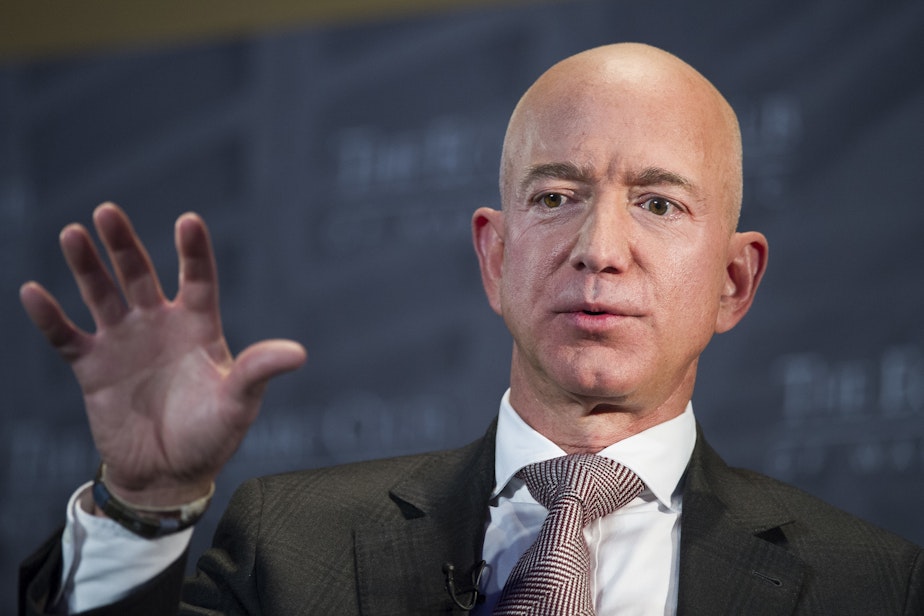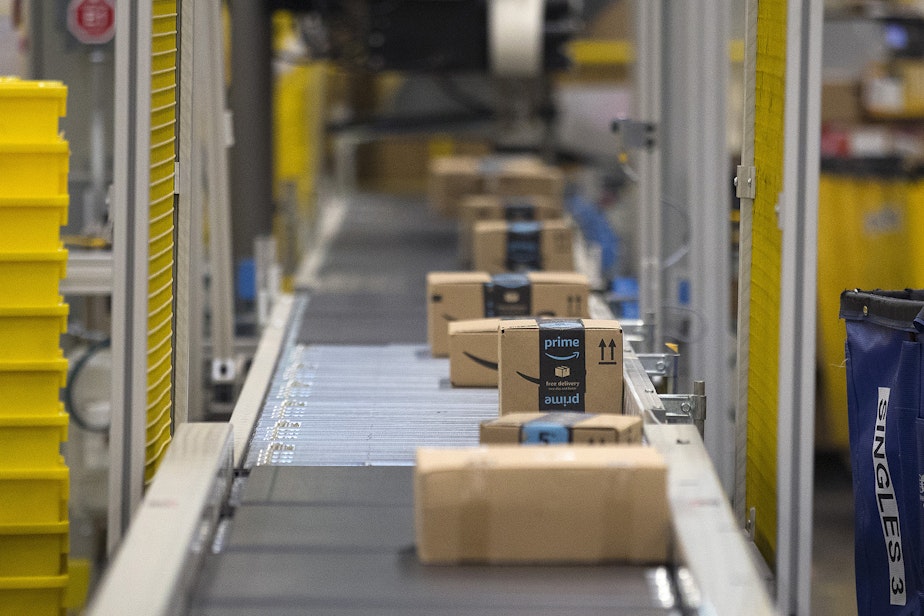This week in head scratchers: Bezos supports a rise in the corporate tax rate?

Amazon founder Jeff Bezos announced support for President Biden’s focus “on making bold investments in American infrastructure.”
And here was the surprising part: Bezos added “we’re supportive of a rise in the corporate tax rate” to help pay for it.
The announcement had people scratching their heads; Bezos has never been a big fan of paying a lot of taxes.
So, what gives?
The president wants to pay for some $2 trillion worth of infrastructure – roads, bridges, electric charging stations, broadband and more – in part by boosting the corporate tax rate from 21 to 28 percent.
In his speech announcing the huge project, Biden singled out Amazon as a company that must pay more in taxes.
"A lot of tech companies, including Amazon, have long had a funny, technocratic, almost libertarian relationship with the government," says KUOW politics reporter David Hyde, adding those companies don't want to pay taxes to a government they see as being bad at efficient problem-solving.
"Some people might see this as a sign that Jeff Bezos and Amazon are starting to find some maturity in their relationship with government, like Microsoft has."
Whether Bezos likes it or not, he and has company have to work with the government.
Sponsored
"So, you might as well make it work to your advantage as much as possible," Hyde says. "It may also be the case that Amazon simply doesn’t worry that much about corporate taxes, because they’ve figured out so many ways to avoid paying them."
Margaret O’Mara is a professor of history at the University of Washington and the author of “The Code: Silicon Valley and the Remaking of America.” And she's pointed out the ways in which Amazon could – and does – avoid taxes.
For one thing: Amazon reinvests a lot of its revenue back into the company, reducing what it ultimately pays in corporate taxes. And that same investment can qualify for tax credits.
There's also a theory that such a tax hike would likely hurt Amazon's competitors like, Walmart more.
Then there's the matter of Amazon and Bezos' public image.
Sponsored
"It’s a great way to change the subject from union votes in Alabama and Amazon employees having to urinate in bottles," says Joni Balter, host of Civic Cocktail on the Seattle Channel.
Amazon warehouse workers at a facility in Bessemer, Ala., will not be forming a union; the union vote Balter referred to was called in Amazon's favor Friday morning.
The majority of Amazon's workers voted against joining the Retail, Wholesale and Department Store Union. The final tally was 1,798 votes against unionizing versus 738 votes in favor of union.
That means Amazon has withstood the largest union push yet among its U.S. workers and avoided the prospect of its first unionized warehouse in America. Some 5,800 people work at Amazon's Bessemer facility and 3,215 cast ballots in the election.
The union is now filing a legal challenge to the election and charges of unfair labor practices against Amazon. It's requesting a hearing by the National Labor Relations Board, "to determine if the results of the election should be set aside because conduct by the employer created an atmosphere of confusion, coercion and/or fear of reprisals and thus interfered with the employees' freedom of choice."
Sponsored
The company argued the union was only interested in collecting the workers' hard-earned money in the form of dues, while Amazon already paid far above the local minimum wage, provided generous healthcare and other benefits.
Rebecca Givan, a labor studies professor at Rutgers University, told NPR the vote might prompt Biden and other U.S. officials to revisit laws that give big advantages to employers, including the freedom "to bombard their employees with anti-union messages."
With regard, then, to the Biden administration, Balter speculates Bezos' support for a corporate tax increase may be strategic: "Amazon might be willing to make a small give early in this process, thereby getting on Joe Biden’s good side, all while figuring the corporate tax increase will not rise to Biden’s full 28 percent," she says. "Maybe it goes to 24 or 25 percent."

Perhaps the most important point to consider is simple: Amazon relies on the country's infrastructure to do business at the scale it does.
Sponsored
"Delivery drivers travel roads and bridges all day. And don’t forget, Amazon is investing heavily in electric vehicles. This package supposedly will include plenty of electric vehicle charging stations," Balter notes; basically, improved infrastructure means Amazon can continue to make those same-day deliveries that attract so many repeat customers.
The details of which specific projects would be funded under Biden's plan are not yet known – much like the fate of the proposal itself as members of Biden's own party balk at the amount of his preferred tax increase.
But there is plenty of room for improvement just about everywhere you look.
In the report card for America’s infrastructure that
The American Society of Civil Engineers releases an annual report card for America's infrastructure, and Washington state got a C for 2021.
Sponsored
The report also noted 399 bridges in that state that are considered structurally deficient; that is up from last year.
Balter and Hyde joined KUOW's Angela King to talk about the week in politics. Listen to the conversation by clicking the audio above.






